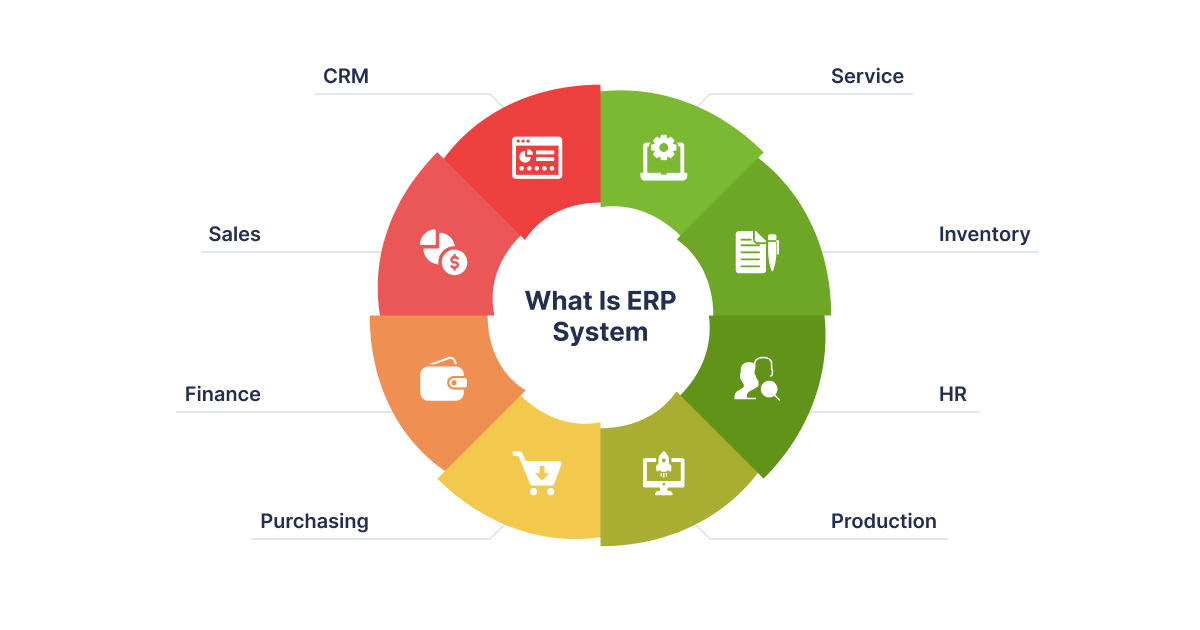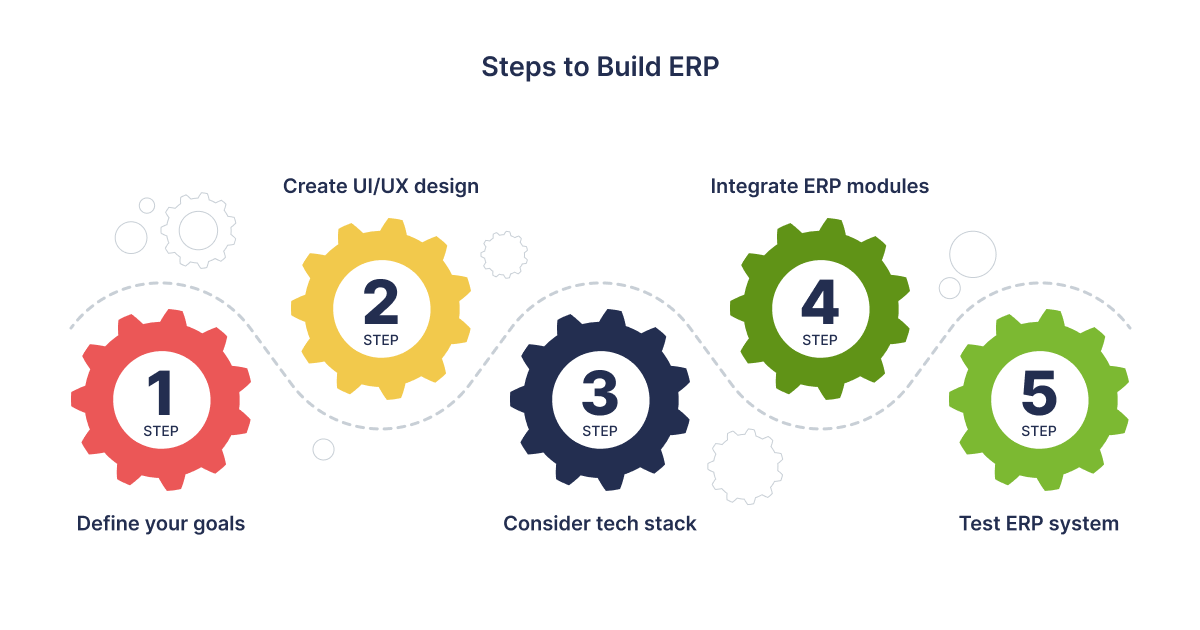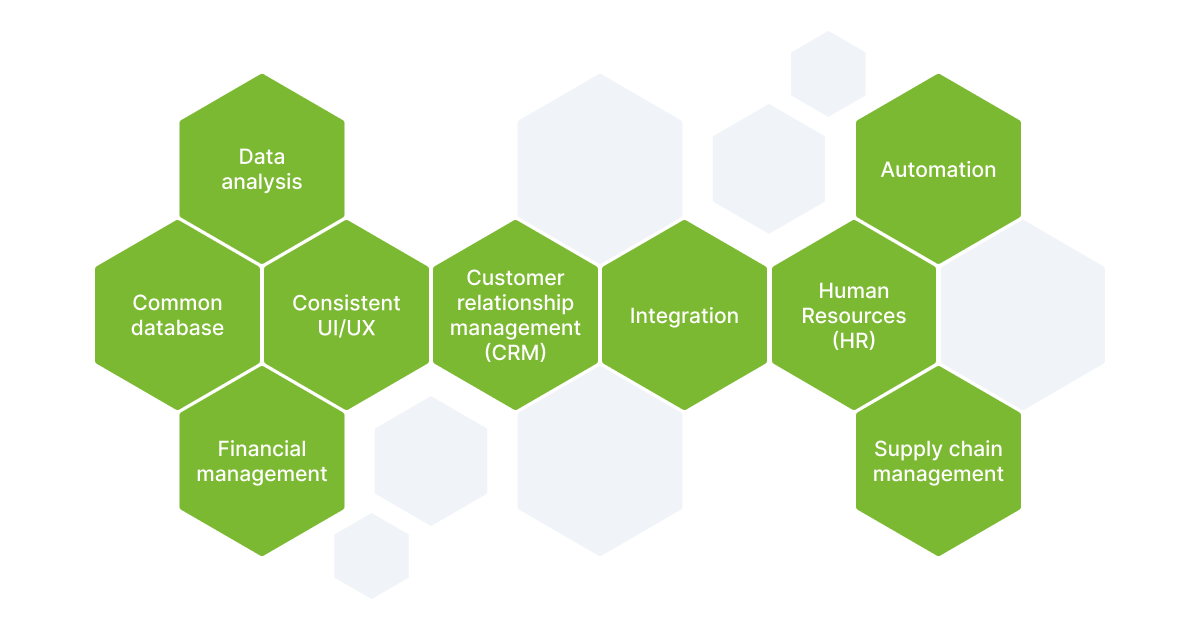How to Build a Custom ERP System in 2024: Cost, Timeline, and Best Practices
Modern technologies undoubtedly make our lives better and easier. That's why, even if your company has not existed for very long, you've definitely heard of ERP Systems.
What are ERP Systems and what are their benefits?
ERP Systems (Enterprise Resource Planning) are designed to make business process management efficient and fast. Of course, the configuration of such solutions may vary. SDH offers custom enterprise software development services. Here are the basic things you can do with the help of ERP solutions:
- unite all the departments in your organization to work efficiently
- speed up document flow
- provide employees with a single information environment (database)
- manage all the resources of your company and simplify accounting processes

How to build a custom ERP system?
The market of modern technologies is ready to offer you pre-built ERP architectures. They can be a really good solution for your business. Especially if the needs of your company do not differ from the majority.
In most cases, there are some nuances that do not meet the client's requirements. That is why, in such cases, ERP application development will be the perfect solution to all your problems. For successful ERP software development, it is important to specify what you want. To do so, you must be as clear as possible about the direction of development of your company and understand what you lack.
Here are some steps that will help to achieve your goals:
Step 1. Consider why you need to build a custom ERP software
The first step in building a custom ERP system is to determine why you need it. Are you looking to improve productivity, streamline business processes, or gain a competitive edge? Understanding your business needs and objectives will help you determine the features and functionalities required for your custom ERP solution.
Step 2. Develop your vision of the system
The next step is to develop a clear vision of the system you want to build. Define the functionalities and features required to achieve your business objectives. Consider the different departments in your organization and their specific needs. Document your vision to ensure that everyone involved in the project has a clear understanding of the system's purpose and goals.
Step 3. Meet with department chiefs to create a list of the required functionality.
Once you have a clear vision of the system, it's time to meet with department chiefs to create a list of required functionality. Each department has unique requirements, and it's important to consider these when building an ERP system. Work with department chiefs to identify the specific features and functionalities that will help them achieve their objectives.
Step 4. Make a decision about where to host your custom ERP solution
The next step is to decide where to host your custom ERP solution. You can choose to host the system on-premise or in the cloud. Hosting on-premise gives you more control over the system, but it also requires a significant upfront investment. Cloud hosting, on the other hand, provides more flexibility and scalability, but it may be more expensive in the long run.
Step 5. Get a software development company to help you develop the ERP system
Building a custom ERP system is a complex process that requires a team of experienced software developers. Partner with a software development company that has expertise in building ERP solutions.
Step 6. Calculate the required time and cost to build the solution
Building a custom ERP solution requires a significant investment of time and money. Work with your software development partner to calculate the required time and cost to build the solution. Ensure that you have a clear understanding of the project timeline and budget before you begin the development phase.
Step 7. Start the development phase
Once you have a clear understanding of the project timeline and budget, it's time to start the development phase. Your software development partner will work with you to build the system according to your vision and requirements. Ensure that you stay involved in the development process to ensure that the system meets your expectations.
Step 8. Test how well it integrates with the company’s business processes
After the development phase, it's important to test how well the system integrates with the company's business processes. Work with different departments to test the system and identify any issues that need to be addressed. Ensure that the system meets the requirements of all departments and that it integrates seamlessly with existing business processes.
Step 9. Deploy
The final step is to deploy the system. Once you have addressed any issues identified during the testing phase, it's time to deploy the system. Ensure that all employees are trained on how to use the system and that all data is migrated correctly. Monitor the system after deployment to ensure that it's performing as expected.
Training of staff to use the application
Once all the basic steps of creating and implementing the system have been successfully completed, you need to train your staff to work with it. For this, the best option would be a couple of group lectures, as well as practical workshops.

Read also: MVP vs Beta-version: What is the Difference?
Features of ERP software
There are a few prominent features that make ERP software stand out from other types of software. These include:
Automation
One of the key features of ERP software is automation. It eliminates manual processes and streamlines business operations, resulting in improved efficiency, reduced errors, and increased productivity. ERP software automates repetitive tasks such as data entry, report generation, and inventory management, freeing up employees' time to focus on more critical tasks.
Consistent UI/UX
A consistent user interface (UI) and user experience (UX) are essential features of ERP software. It ensures that employees can quickly navigate the system and complete tasks with ease, reducing the learning curve and increasing productivity. A consistent UI/UX also improves employee satisfaction and reduces frustration, leading to a more productive workforce.
Data Analysis
ERP software provides comprehensive data analysis capabilities, allowing businesses to analyze their data and make informed decisions. The data analysis features include data visualization, reporting, and predictive analytics. The software can generate reports for various business functions such as finance, sales, inventory management, and more, providing businesses with real-time insights into their operations.
Integration
ERP software integrates with various business systems such as customer relationship management (CRM) and supply chain management (SCM), allowing businesses to streamline their operations and eliminate data silos. Integration ensures that all departments have access to the same information, improving collaboration and decision-making. ERP software can also integrate with third-party software, further expanding its capabilities.
Customer Relationship Management (CRM) module
The CRM module is an essential feature of ERP software. It allows businesses to manage their customer relationships effectively by providing a unified view of customer interactions. The CRM module includes features such as contact management, lead management, and sales automation, enabling businesses to improve customer satisfaction and increase sales.
Human Resources (HR) module
The HR module is another crucial feature of ERP software. It provides businesses with a unified platform to manage their HR operations such as employee onboarding, performance management, and payroll. The HR module streamlines HR processes, improves employee engagement, and ensures compliance with employment laws and regulations.
Supply Chain Management module
The supply chain management module is another essential feature of ERP software. It allows businesses to manage their supply chain operations such as procurement, inventory management, and logistics. The module provides businesses with real-time visibility into their supply chain, enabling them to optimize their processes and reduce costs.
Security
ERP software is designed with security in mind, ensuring that data is protected from unauthorized access. This includes features such as role-based access control, which restricts access to sensitive information based on an employee's role in the organization. Security features also include data encryption, backups, and disaster recovery, ensuring that data is always available and protected.
Reporting
ERP software provides comprehensive reporting capabilities, allowing businesses to analyze their data and make informed decisions. Reports can be generated for various business functions, such as financial reporting, inventory management, and sales analysis. Reporting is crucial for businesses to understand their operations, identify areas for improvement, and make data-driven decisions.
Mobile Access
ERP software is now available on mobile devices, allowing employees to access information and perform tasks from anywhere. This feature is especially important for businesses with remote employees or employees who work on the go. Mobile access also allows employees to respond to customer inquiries and access real-time data, improving customer service and decision-making.

Timeline and cost of development
The cost and time of product development are determined by the client's needs, so everything is quite individual. Generally, you should understand that the process is not quick, so be prepared to wait for more than six months. The average price range will be around $120,000.
In any case, the decision to implement an ERP application will definitely make your business better and more efficient. And good scalability of the product is beneficial to you.
Software Development Hub already has experience in running an ERP system. FieldHub is one of the best projects that allows you to manage your business efficiently. Some of its key features include:
- complete management of financial flows
- organisation of workflows and personnel
- planning and scheduling
The timeline and cost of developing an ERP system depend on several factors, including the complexity of the modules, the size of the development team, and the level of customization required.
Assuming that the ERP system includes the modules mentioned and the development team consists of seven members, a rough estimate for the timeline and cost of developing the ERP system would be:
Timeline of ERP development
- CRM module: 3-4 months
- HR module: 2-3 months
- Supply Chain Management module: 4-5 months
- Billing Integration: 1-2 months
- Analytics and Reporting dashboards: 2-3 months
Total timeline: 12-17 months
Cost of ERP development
The cost of software development varies widely depending on location, the experience of the development team, and other factors. However, a rough estimate of the cost of developing an ERP system with the mentioned modules and a team of seven members would be:
- Architect: $55-65 per hour x 3-4 months = $9,240 - $13,520
- UX/UI Designer: $30-50 per hour x 4-5 months = $4,800 - $10,000
- HTML/CSS Developer: $25-35 per hour x 4-5 months = $4,000 - $6,125
- Business Analyst/Project Manager: $25-35 per hour x 4-5 months = $4,000 - $6,125
- Backend Developer: $40-55 per hour x 12-15 months = $69,120 - $103,125
- Frontend Developer: $40-55 per hour x 12-15 months = $69,120 - $103,125
- QA Engineer: $20-30 per hour x 12-15 months = $34,560 - $51,750
- DevOps Engineer: $45-55 per hour x 4-5 months = $7,200 - $13,750
Total cost: $192,040 - $306,500
Note that the above estimates are still rough and may vary significantly depending on the specifics of the project, such as the complexity of the modules, the level of customization required, and the specific requirements of the client. It's essential to work with a qualified software development team to get a more accurate estimate for your particular project.
If you want to develop a solution for your business, feel free to contact us and we'll help with realizing it. We have extensive experience in outsourcing IT services and a reliable team of professionals. More than 9 million people all over the world already use our products. Our core competencies include web and mobile engineering, Iot, and custom software development. We provide enterprise software development services and software development services for startups. Highly qualified specialists will offer cost-friendly and convenient solutions to achieve your business goals.
Budget with confidence – use our ERP software cost calculator.
Categories
About the authors
Share
Need a project estimate?
Drop us a line, and we provide you with a qualified consultation.








